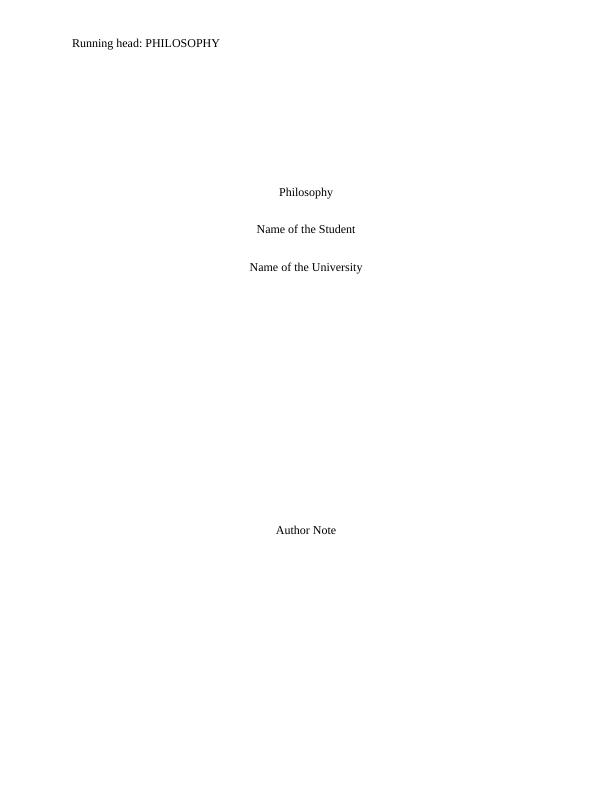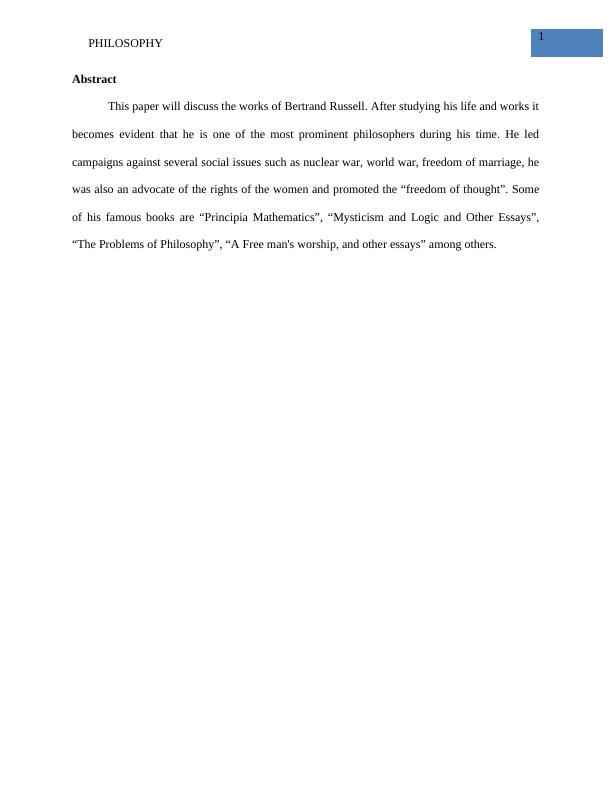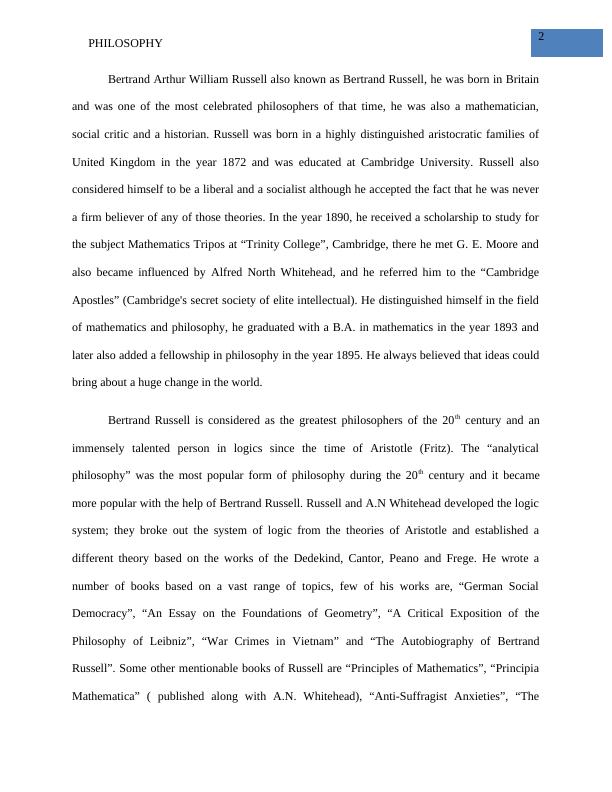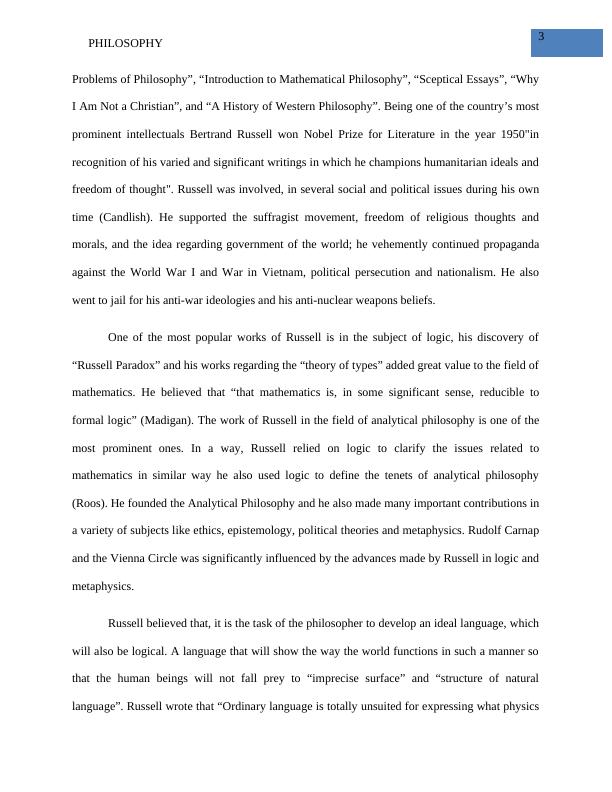Bertrand Russell: Life, Works, and Contributions to Philosophy and Society
Added on 2023-06-15
11 Pages2820 Words332 Views
Running head: PHILOSOPHY
Philosophy
Name of the Student
Name of the University
Author Note
Philosophy
Name of the Student
Name of the University
Author Note

1
PHILOSOPHY
Abstract
This paper will discuss the works of Bertrand Russell. After studying his life and works it
becomes evident that he is one of the most prominent philosophers during his time. He led
campaigns against several social issues such as nuclear war, world war, freedom of marriage, he
was also an advocate of the rights of the women and promoted the “freedom of thought”. Some
of his famous books are “Principia Mathematics”, “Mysticism and Logic and Other Essays”,
“The Problems of Philosophy”, “A Free man's worship, and other essays” among others.
PHILOSOPHY
Abstract
This paper will discuss the works of Bertrand Russell. After studying his life and works it
becomes evident that he is one of the most prominent philosophers during his time. He led
campaigns against several social issues such as nuclear war, world war, freedom of marriage, he
was also an advocate of the rights of the women and promoted the “freedom of thought”. Some
of his famous books are “Principia Mathematics”, “Mysticism and Logic and Other Essays”,
“The Problems of Philosophy”, “A Free man's worship, and other essays” among others.

2
PHILOSOPHY
Bertrand Arthur William Russell also known as Bertrand Russell, he was born in Britain
and was one of the most celebrated philosophers of that time, he was also a mathematician,
social critic and a historian. Russell was born in a highly distinguished aristocratic families of
United Kingdom in the year 1872 and was educated at Cambridge University. Russell also
considered himself to be a liberal and a socialist although he accepted the fact that he was never
a firm believer of any of those theories. In the year 1890, he received a scholarship to study for
the subject Mathematics Tripos at “Trinity College”, Cambridge, there he met G. E. Moore and
also became influenced by Alfred North Whitehead, and he referred him to the “Cambridge
Apostles” (Cambridge's secret society of elite intellectual). He distinguished himself in the field
of mathematics and philosophy, he graduated with a B.A. in mathematics in the year 1893 and
later also added a fellowship in philosophy in the year 1895. He always believed that ideas could
bring about a huge change in the world.
Bertrand Russell is considered as the greatest philosophers of the 20th century and an
immensely talented person in logics since the time of Aristotle (Fritz). The “analytical
philosophy” was the most popular form of philosophy during the 20th century and it became
more popular with the help of Bertrand Russell. Russell and A.N Whitehead developed the logic
system; they broke out the system of logic from the theories of Aristotle and established a
different theory based on the works of the Dedekind, Cantor, Peano and Frege. He wrote a
number of books based on a vast range of topics, few of his works are, “German Social
Democracy”, “An Essay on the Foundations of Geometry”, “A Critical Exposition of the
Philosophy of Leibniz”, “War Crimes in Vietnam” and “The Autobiography of Bertrand
Russell”. Some other mentionable books of Russell are “Principles of Mathematics”, “Principia
Mathematica” ( published along with A.N. Whitehead), “Anti-Suffragist Anxieties”, “The
PHILOSOPHY
Bertrand Arthur William Russell also known as Bertrand Russell, he was born in Britain
and was one of the most celebrated philosophers of that time, he was also a mathematician,
social critic and a historian. Russell was born in a highly distinguished aristocratic families of
United Kingdom in the year 1872 and was educated at Cambridge University. Russell also
considered himself to be a liberal and a socialist although he accepted the fact that he was never
a firm believer of any of those theories. In the year 1890, he received a scholarship to study for
the subject Mathematics Tripos at “Trinity College”, Cambridge, there he met G. E. Moore and
also became influenced by Alfred North Whitehead, and he referred him to the “Cambridge
Apostles” (Cambridge's secret society of elite intellectual). He distinguished himself in the field
of mathematics and philosophy, he graduated with a B.A. in mathematics in the year 1893 and
later also added a fellowship in philosophy in the year 1895. He always believed that ideas could
bring about a huge change in the world.
Bertrand Russell is considered as the greatest philosophers of the 20th century and an
immensely talented person in logics since the time of Aristotle (Fritz). The “analytical
philosophy” was the most popular form of philosophy during the 20th century and it became
more popular with the help of Bertrand Russell. Russell and A.N Whitehead developed the logic
system; they broke out the system of logic from the theories of Aristotle and established a
different theory based on the works of the Dedekind, Cantor, Peano and Frege. He wrote a
number of books based on a vast range of topics, few of his works are, “German Social
Democracy”, “An Essay on the Foundations of Geometry”, “A Critical Exposition of the
Philosophy of Leibniz”, “War Crimes in Vietnam” and “The Autobiography of Bertrand
Russell”. Some other mentionable books of Russell are “Principles of Mathematics”, “Principia
Mathematica” ( published along with A.N. Whitehead), “Anti-Suffragist Anxieties”, “The

3
PHILOSOPHY
Problems of Philosophy”, “Introduction to Mathematical Philosophy”, “Sceptical Essays”, “Why
I Am Not a Christian”, and “A History of Western Philosophy”. Being one of the country’s most
prominent intellectuals Bertrand Russell won Nobel Prize for Literature in the year 1950"in
recognition of his varied and significant writings in which he champions humanitarian ideals and
freedom of thought". Russell was involved, in several social and political issues during his own
time (Candlish). He supported the suffragist movement, freedom of religious thoughts and
morals, and the idea regarding government of the world; he vehemently continued propaganda
against the World War I and War in Vietnam, political persecution and nationalism. He also
went to jail for his anti-war ideologies and his anti-nuclear weapons beliefs.
One of the most popular works of Russell is in the subject of logic, his discovery of
“Russell Paradox” and his works regarding the “theory of types” added great value to the field of
mathematics. He believed that “that mathematics is, in some significant sense, reducible to
formal logic” (Madigan). The work of Russell in the field of analytical philosophy is one of the
most prominent ones. In a way, Russell relied on logic to clarify the issues related to
mathematics in similar way he also used logic to define the tenets of analytical philosophy
(Roos). He founded the Analytical Philosophy and he also made many important contributions in
a variety of subjects like ethics, epistemology, political theories and metaphysics. Rudolf Carnap
and the Vienna Circle was significantly influenced by the advances made by Russell in logic and
metaphysics.
Russell believed that, it is the task of the philosopher to develop an ideal language, which
will also be logical. A language that will show the way the world functions in such a manner so
that the human beings will not fall prey to “imprecise surface” and “structure of natural
language”. Russell wrote that “Ordinary language is totally unsuited for expressing what physics
PHILOSOPHY
Problems of Philosophy”, “Introduction to Mathematical Philosophy”, “Sceptical Essays”, “Why
I Am Not a Christian”, and “A History of Western Philosophy”. Being one of the country’s most
prominent intellectuals Bertrand Russell won Nobel Prize for Literature in the year 1950"in
recognition of his varied and significant writings in which he champions humanitarian ideals and
freedom of thought". Russell was involved, in several social and political issues during his own
time (Candlish). He supported the suffragist movement, freedom of religious thoughts and
morals, and the idea regarding government of the world; he vehemently continued propaganda
against the World War I and War in Vietnam, political persecution and nationalism. He also
went to jail for his anti-war ideologies and his anti-nuclear weapons beliefs.
One of the most popular works of Russell is in the subject of logic, his discovery of
“Russell Paradox” and his works regarding the “theory of types” added great value to the field of
mathematics. He believed that “that mathematics is, in some significant sense, reducible to
formal logic” (Madigan). The work of Russell in the field of analytical philosophy is one of the
most prominent ones. In a way, Russell relied on logic to clarify the issues related to
mathematics in similar way he also used logic to define the tenets of analytical philosophy
(Roos). He founded the Analytical Philosophy and he also made many important contributions in
a variety of subjects like ethics, epistemology, political theories and metaphysics. Rudolf Carnap
and the Vienna Circle was significantly influenced by the advances made by Russell in logic and
metaphysics.
Russell believed that, it is the task of the philosopher to develop an ideal language, which
will also be logical. A language that will show the way the world functions in such a manner so
that the human beings will not fall prey to “imprecise surface” and “structure of natural
language”. Russell wrote that “Ordinary language is totally unsuited for expressing what physics

End of preview
Want to access all the pages? Upload your documents or become a member.
Related Documents
Bertrand Russell: Life, Career, and Contributionslg...
|9
|2703
|322
